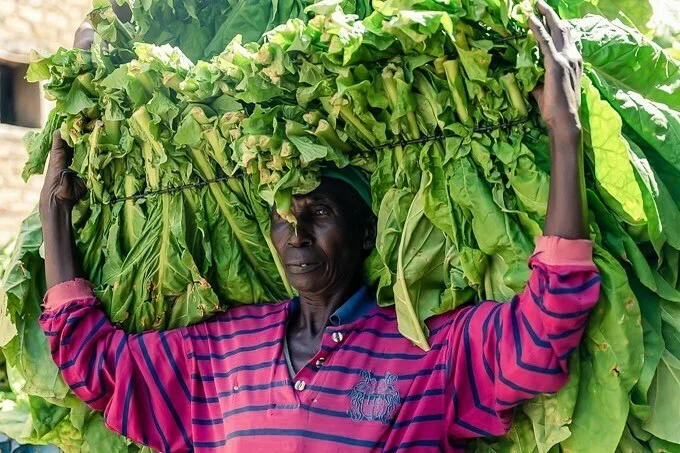|
Getting your Trinity Audio player ready...
|
Writes Innocent Mujeri
It is imperative to confront the glaring price disparities that have long plagued the tobacco industry in Zimbabwe. These disparities, particularly between auction and contract prices, have consistently disadvantaged small-scale farmers. Addressing these issues is not merely about fairness; it is about ensuring the sustainability and prosperity of the entire sector.
The price gap has far-reaching consequences for small-scale growers. With lower earnings, these farmers often struggle to repay loans taken out for tobacco production, leading to a vicious cycle of debt. This financial strain not only hampers their ability to invest in better farming practices but also limits their capacity to improve their livelihoods. The continuous debt trap forces growers into an endless cycle of dependency on contracting companies, which exacerbates their economic vulnerability.
Moreover, the reduced income compels many growers to resort to side marketing, selling their crops to other contractors to retain some earnings and evade debt deductions. This practice destabilizes the market and undermines the integrity of contractual agreements. In addition, the financial instability caused by low prices jeopardizes both the financial and environmental sustainability of tobacco farming in Zimbabwe.
A thriving tobacco industry hinges on the success of its growers. Therefore, it is crucial to address the factors that contribute to the price disparities. One significant issue is the quality of tobacco produced by small-scale farmers. Often, these growers lack access to high-quality inputs and modern farming techniques, resulting in lower-quality produce that fetches lower prices. According to the Tobacco Industry and Marketing Board (TIMB), only about 30% of tobacco from small-scale farmers meets top-quality grades, compared to over 60% from larger commercial farms.
Post-harvest losses also significantly impact the earnings of small-scale farmers. Poor handling and storage practices, coupled with inadequate post-harvest infrastructure, lead to substantial losses estimated at over 20%. These losses reduce the quantity of marketable tobacco, further diminishing potential earnings. Improving post-harvest handling could reduce these losses to below 5%, thereby increasing the marketable yield and enhancing growers’ income.
Another challenge is the low yields achieved by small-scale farmers, typically below 1.5 tons per hectare, compared to the 2.5 to 3 tons per hectare seen in well-resourced commercial farms. This yield gap is primarily due to insufficient access to improved seed varieties, fertilizers, and modern farming techniques. Enhancing access to these resources could increase yields by up to 50%, significantly boosting farmers’ productivity and profitability.
The current regulatory framework also plays a role in perpetuating price disparities. The TIMB faces difficulties in enforcing auction-contract pricing regulations due to various market dynamics and regulatory limitations. The existing framework lacks effective mechanisms for price control and monitoring, making it challenging to ensure fair pricing practices across the board.
To rectify these issues, stakeholders must adopt a multifaceted approach. One proposed solution is the implementation of a hybrid pricing model that integrates elements of both auction and contract pricing. This model would establish a base price with additional premiums for quality and timely delivery, providing a more predictable and stable income for growers.
Enhanced capacitation programs are also essential. While initiatives by the Tobacco Leaf Exporters Association of Zimbabwe (TLEAZ) have made strides in training farmers, there is a need for innovative approaches to further these efforts. Comprehensive training on modern farming techniques, quality improvement, and efficient post-harvest handling can significantly boost yields and reduce losses. Such programs have already shown promising results, with increased yields and reduced post-harvest losses in pilot projects.
Furthermore, grower associations must play a proactive role in educating their members about best practices in tobacco farming. Regular workshops, field days, and access to extension services can empower farmers with the knowledge and skills needed to improve their productivity and profitability. Mentorship programs, especially those targeting youth and women, should be intensified to ensure the next generation of farmers adopts international standards of tobacco production.
Promoting sustainable farming practices is also critical. Environmental sustainability must go hand in hand with financial sustainability. Implementing practices that reduce the environmental impact of tobacco farming, such as using energy-efficient curing methods and adopting alternative fuel systems, can lower costs and protect natural resources. These sustainable practices ensure that future generations can continue to produce tobacco profitably.
Collaboration with non-exporting companies is another vital step. These companies should implement capacitation programs similar to those of exporting companies, ensuring all growers have access to necessary resources and knowledge. Joint training initiatives and shared resources can enhance the overall quality of tobacco produced and improve market stability.
Lastly, reducing side marketing requires a holistic approach. Strengthening contractual agreements, enhancing traceability systems, and offering better incentives for loyalty can mitigate the incidence of side marketing. Digital platforms for tracking deliveries and payments can improve transparency and build trust between growers and buyers, ensuring growers see clear benefits from staying within formal marketing channels.
Addressing the challenges faced by small-scale tobacco growers in Zimbabwe necessitates a comprehensive and collaborative effort. By adopting a hybrid pricing model, enhancing capacitation programs, promoting sustainable practices, and strengthening grower education and support, the industry can ensure equitable benefits for all stakeholders.
TIMB, TLEAZ, grower associations, and non-exporting companies need to work together to create an environment where small-scale growers can thrive. Such an approach will not only enhance their livelihoods but also ensure the long-term profitability and sustainability of Zimbabwe’s tobacco industry.
Through concerted efforts, the industry can overcome existing disparities and pave the way for a more equitable and prosperous future, benefiting growers, merchants, and contracting companies alike.






